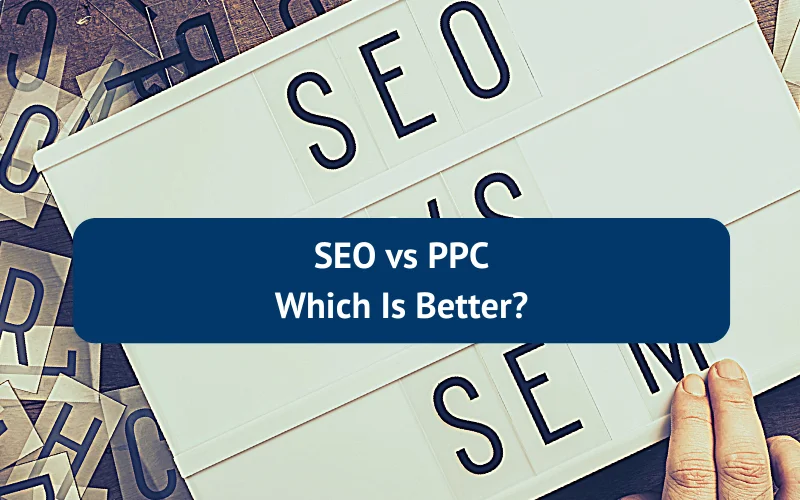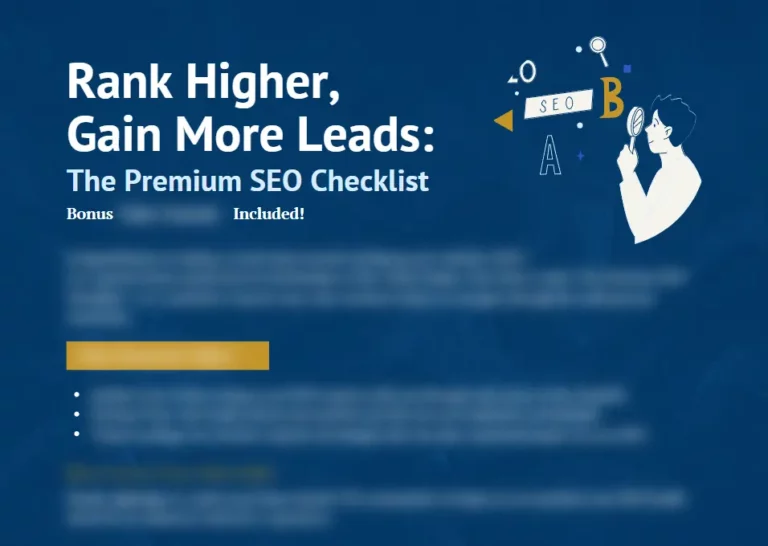Picture this: You’ve launched a shiny new website, filled with compelling content and eye-catching graphics.
But you’re now faced with a crucial question – how do you drive traffic to your site?
There are two primary paths you can take: Search Engine Optimization (SEO) or Pay-Per-Click (PPC) advertising.
But which is the right path for you?
Let’s dive into the world of SEO vs PPC, exploring their pros and cons, and how they can be integrated for maximum impact.
TL:DR
- SEO and PPC are both effective digital marketing strategies, each with their own set of advantages and disadvantages.
- Combining SEO and PPC can create a synergistic effect to maximize results for businesses.
What is SEO?
SEO, or Search Engine Optimization, is like the magic spell for your website.
It’s the process of optimizing your web pages to rank higher in the organic search results of search engines like Google.
SEO is not about stuffing your content with relevant keywords.
It’s a fine art that involves a mix of on-page SEO, where you align your content with user’s search intent and optimize elements like title tags, image tags, meta descriptions, and internal links; and off-page SEO, where you engage in activities outside of your website, like link building and content creation, all in a bid to improve your search engine rankings.
Think of SEO as a marathon, not a sprint, providing a steady, sustainable flow of organic traffic to your website.
Advantages of SEO
Just like a marathon runner enjoys the rewards of long-term fitness, SEO offers a host of enduring benefits. Some of these benefits include:
- Cost-effectiveness
- Increased visibility and organic traffic
- Improved user experience and website usability
- Higher trust and credibility
- Long-term results and sustainability
SEO can be a powerful tool in your digital marketing strategy toolkit, and an effective SEO campaign can significantly boost your online presence.
But what does this mean for your business?
Let’s delve deeper into each of these benefits of SEO.
Cost-Effectiveness
Think of SEO as the gift that keeps on giving. Unlike PPC, where you pay per click, SEO is free.
Every click, every visitor, and every bit of organic traffic you earn through SEO costs you nothing.
This makes SEO a cost-effective way to drive traffic to your website.
In fact, the return on investment (ROI) for SEO earned traffic is typically higher than that of paid search ads.
Imagine having a billboard that you don’t have to pay for but still brings in customers.
That’s the power of SEO.
Long-Term Results
If SEO was a plant, it would be a sturdy oak tree – it takes time to grow, but once it does, it provides shade for many years.
SEO requires consistent effort over a period of time.
It is a long-term strategy.
While it can take time to see results, the benefits are long-lasting.
Once your website starts ranking high in search results, you can reap the benefits for a long time.
Moreover, unlike PPC, traffic doesn’t stop the moment you stop investing money.
The organic traffic remains consistent, providing a steady flow of potential customers.
Trust and Credibility
SEO is like the perfect salesman – it not only brings in the customers but also builds trust and credibility.
When your website ranks high in organic search results, it signals to users that your site is a credible source of information.
And the more users trust your site, the more likely they are to become customers.
By providing relevant and beneficial information to your users, SEO helps you build a relationship of trust, which then translates into higher rankings in search results.
Quality Organic Traffic
With SEO, you’re not just attracting more traffic – you’re attracting better traffic.
SEO targets users who are actively searching for information related to your product or service.
This means the traffic you get from SEO is more likely to convert into leads or sales.
Think of it as opening a store in a busy shopping mall instead of a deserted street – you’re positioning yourself where your customers are.
Disadvantages of SEO
But just like any marathon runner will tell you, the road to success is not always smooth.
SEO too has its share of challenges, including slow results, competition, and the constantly changing landscape of search engine algorithms.
But fear not, with a sound strategy and a bit of patience, these hurdles can be overcome.
Let’s take a closer look at these challenges.
Slow Results
In the world of SEO, patience is truly a virtue. SEO is a gradual process.
It can take some time for it to show results.
It’s not a one-time event, but an ongoing process that requires continuous effort, refinement, and adjustments.
While this can be frustrating, especially if you’re eager to see quick results, the wait is worth it.
Remember the old saying, “Good things come to those who wait”?
It certainly applies to SEO.
Competition
Just like a marathon, SEO is a race where you’re not just running against the clock, but against other competitors too.
With millions of websites vying for the top spots in search results, SEO often becomes a game of who can optimize their site the best.
But don’t let this deter you.
With a good SEO strategy, even small businesses can outrank larger competitors.
Algorithm Updates
If SEO is a game, then search engines are the rule-makers.
And these rules are constantly changing.
Search engines regularly update their algorithms to provide better results for users, including google search results.
While these updates are designed to improve the search experience for users, they can also impact your site’s SEO rankings.
However, by focusing on providing high-quality content and a great user experience, your site can weather these changes.
What is PPC?
Now that we’ve navigated the winding paths of SEO, let’s switch gears and explore the fast lane of Pay-Per-Click (PPC) advertising.
PPC is like a sprint race – it’s a quicker, more immediate way to get your website in front of your audience.
In PPC, advertisers pay a fee each time one of their ads is clicked.
It’s essentially a way of buying visits to your site, rather than earning them organically.
And just like sprinters use spikes for better grip and speed, PPC uses targeted keywords to boost visibility and drive traffic.
Advantages of PPC
Just as a sprinter enjoys the thrill of speed, there are certain benefits that PPC brings to the table.
From immediate results to precise targeting and top-of-page visibility, PPC can supercharge your online presence.
But what do these benefits mean for your business?
Let’s sprint through each of these advantages.
Immediate Results
One of the main advantages of PPC is that it delivers quick results.
As soon as your PPC campaign is live, your ads can appear on search result pages and start driving traffic to your site.
This makes PPC a great option for businesses that need to drive traffic quickly, such as for a time-limited offer or a seasonal product.
It’s like a quick energy boost that propels you forward.
Precise Targeting
PPC allows you to target your audience with laser-like precision.
You can target users based on:
- Keywords
- Location
- Demographics
- Time of day
This means your paid ads are shown to people who are most likely to be interested in your products or services.
It’s like having a personal coach who knows exactly what you need and tailors your training program to suit your needs.
Top-of-Page Visibility
With PPC, your ads appear at the top of search engine results pages, giving your business maximum visibility through Google Ads.
This prime placement ensures your ads are the first thing users see when they search for your targeted keywords.
It’s like running in the inside lane of a race track – you’re in a prime position to be seen and get ahead of your competitors.
PPC, also known as ppc marketing, is an effective way to reach potential customers and increase your visibility online.
Data-Driven Optimization
PPC campaigns provide a wealth of data that you can use to optimize your campaign performance.
From click-through rates to conversion rates, this data can provide valuable insights into what’s working and what’s not, allowing you to make data-driven decisions and optimize your ROI.
It’s like having a fitness tracker that provides real-time feedback on your performance, helping you to tweak your strategy and improve your results.
Disadvantages of PPC
Just like a sprint race can be over in a blink of an eye, PPC also has some challenges.
From costs to ads fatigue, and the need for skilled management, PPC isn’t without its hurdles.
But as any successful athlete will tell you, hurdles are meant to be jumped.
Let’s explore these challenges in more detail.
Cost
The most obvious downside to PPC is the cost. You have to pay every time someone clicks on your advertisement.
This can add up quickly. And the cost per click can add up, especially if you’re targeting competitive keywords.
It’s like hiring a personal trainer – it can be a great investment, but it can also be expensive.
However, with careful management and optimization, PPC can still provide a good return on investment.
Ad Fatigue
Just like a sprinter can tire out if they run too many races in a row, your audience can also suffer from ads fatigue.
If your ads are shown too often, users can become desensitized and stop paying attention.
This can result in lower click-through rates and lower conversion rates.
However, with careful ad rotation and refreshing of ads creative, you can keep your ads fresh and engaging.
Skilled Management
Managing a PPC campaign is not a walk in the park.
It requires a deep understanding of the PPC platform, keyword research, ad creation, and data analysis.
It’s like being a race car driver – you need to know how to navigate the track, handle the car, and make split-second decisions.
But with the right skills and experience, PPC can drive significant results for your business.
SEO vs PPC: Which Is Better?
So, SEO or PPC?
Marathon or sprint?
The answer isn’t as simple as one or the other.
The best choice depends on your business goals, your budget, and the level of competition in your industry.
It’s like choosing between training for a marathon or a sprint – it depends on your fitness level, your goals, and your personal preference.
Let’s explore when to use each strategy.
When to Use SEO
If your business is looking for long-term growth, building trust and credibility with your audience, and driving a steady stream of organic traffic to your website, then SEO is the way to go.
It’s like investing in a robust marathon training plan – it takes time and effort, but the results can last for years.
SEO is a long-term strategy that requires dedication and consistency.
When to Use PPC
If you’re after immediate results, need to target a specific audience, or have a time-sensitive offer, then PPC is your best bet.
It’s like a sprint race – it’s quick, it’s focused, and it can give you a quick win.
Just like a sprinter needs to rest and recover between races, a PPC campaign also needs careful management to ensure it’s sustainable in the long run.
PPC campaigns require a lot of attention and effort to ensure they’re successful.
Combining SEO and PPC
But who says you have to choose between a marathon and a sprint?
Why not do both?
Combining SEO and PPC can maximize results, leveraging the strengths of both strategies.
It’s like being a decathlete – you’re not just good at one event, you’re good at many.
Let’s explore the benefits of this multi-event approach.
Synergy
When SEO and PPC work together, they can create a synergistic effect.
The visibility you gain from PPC can boost your SEO efforts, while the organic credibility you build with SEO can make your PPC ads more effective.
It’s like training for both endurance and speed – the two complement each other and make you a better overall athlete.
Data Sharing
Data from your PPC campaigns can provide valuable insights that can inform your SEO strategy.
For example, you can use data on which PPC ads get the most clicks to inform your keyword strategy for SEO.
It’s like using your performance data from sprint races to inform your marathon training plan.
Targeting Different Stages of the Buyer’s Journey
By using both SEO and PPC, you can target different stages of the buyer’s journey.
While SEO is great for generating awareness and driving organic traffic, PPC is excellent for targeting users who are ready to buy.
It’s like having different training plans for the off-season, the pre-season, and the competitive season – each one targeting a different phase of your athletic development.
PPC is a great way to reach users who are ready to buy, as it allows you to reach users who are ready to buy.
Synergy of SEO and PPC
In the race to drive traffic and conversions, both SEO and PPC have their own strengths.
Like a marathoner and a sprinter, they each shine in their own ways. SEO offers long-term, sustainable results and builds trust and credibility, while PPC provides immediate results, precise targeting, and top-of-page visibility.
But when combined, they can create a synergistic effect that maximizes results.
Like having a personal coach, an SEO company can help you effectively implement and manage both SEO and PPC strategies, maximizing your results and ROI.
Whether you choose SEO, PPC, or a combination of both, the key is to align your strategy with your business goals, your budget, and your audience’s needs.
And remember, in the race for online visibility, slow and steady can win the race, but a well-timed sprint can also steal the show.
Frequently Asked Questions
What is a major difference between SEO and PPC?
The major difference between SEO and PPC is that SEO is an organic form of SEM that takes time to produce results, while PPC is a paid form of SEM that delivers instant results.
Both require keyword research and content creation, but PPC involves bidding on the chance to show ads on search engine result pages.
Why SEO is better than PPC?
SEO offers consistent results, increases website value and authority, is cost-effective and gives you a higher ROI than PPC.
Whereas, PPC provides immediate results with targeted audiences in a limited time-frame.
Does PPC improve SEO?
PPC does not directly improve SEO, but investing in both PPC and SEO can help create a cohesive marketing campaign that benefits your business.
PPC can also help display your ads to potential customers at the exact moment they’re searching for a business like yours.
What are the main benefits of SEO?
SEO delivers cost-effectiveness, long-term results, trust and credibility, and quality organic traffic, making it a great choice for businesses of all sizes.




